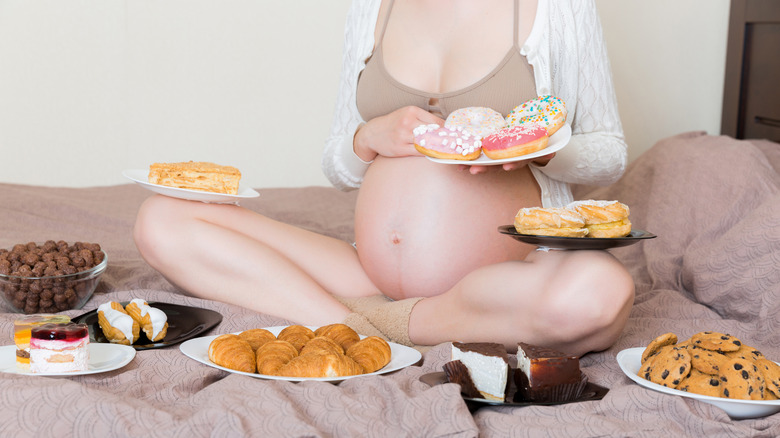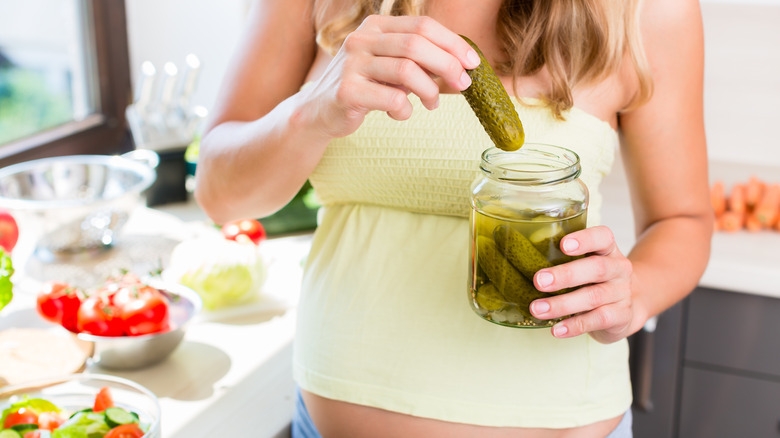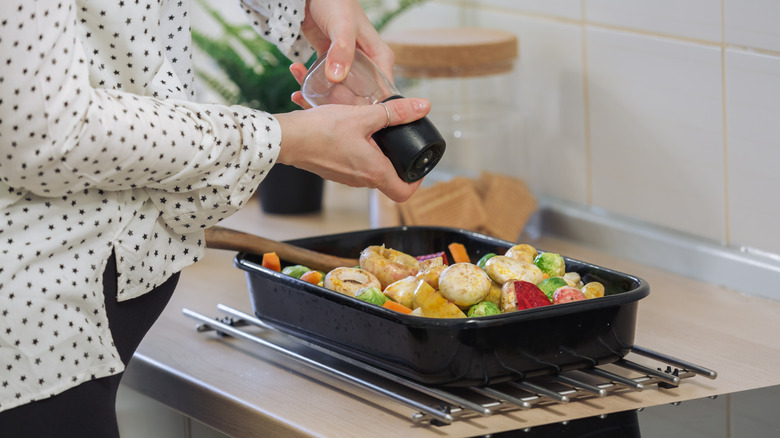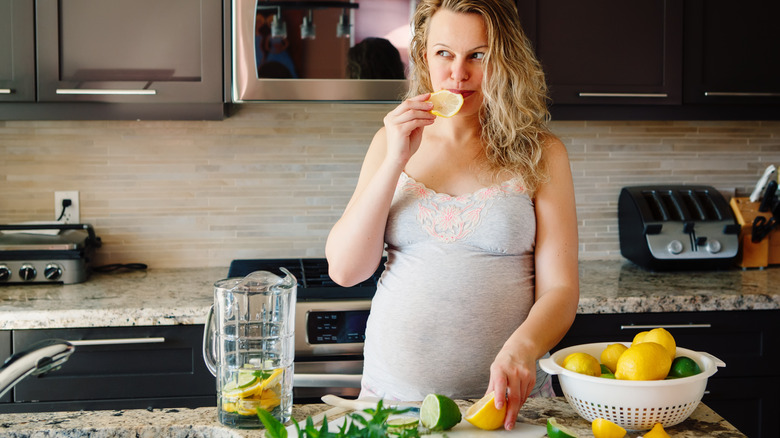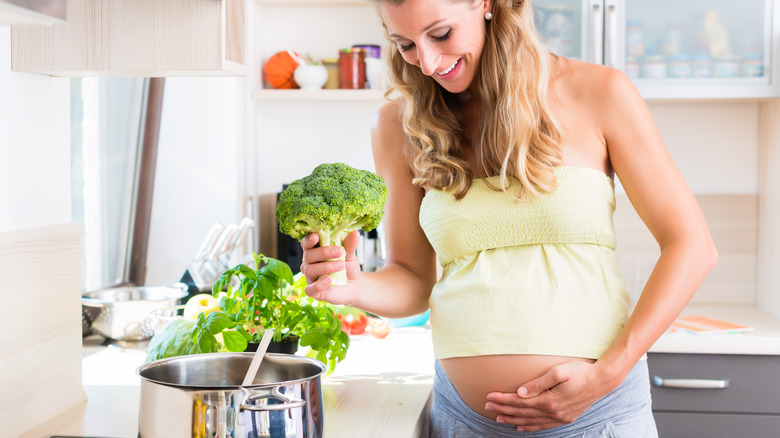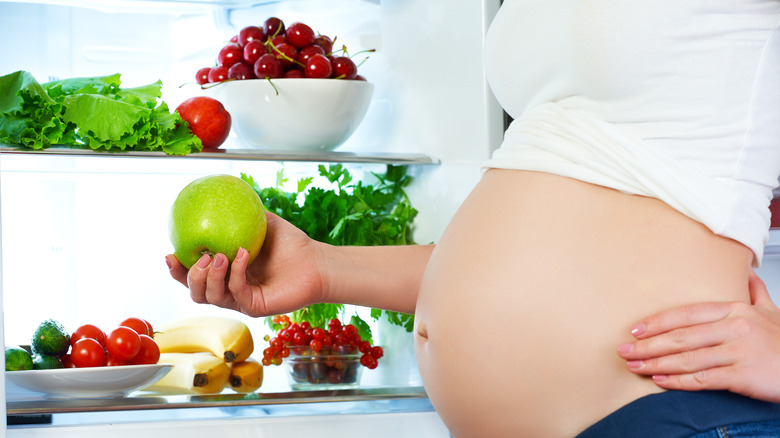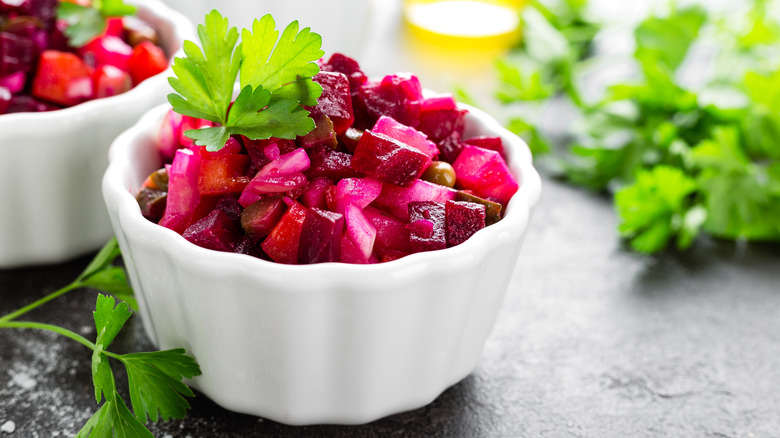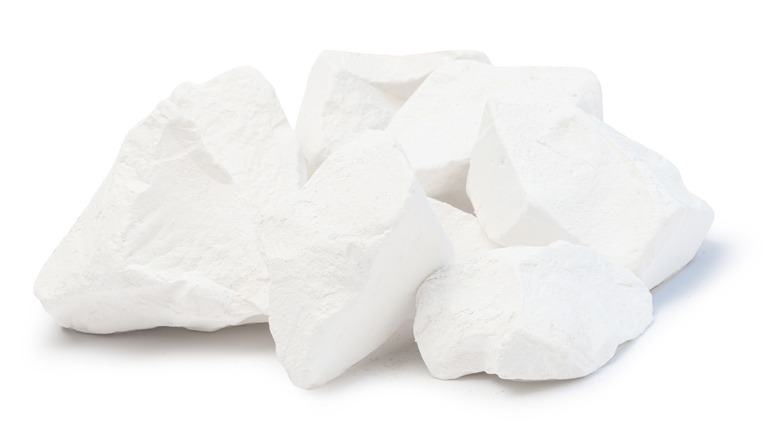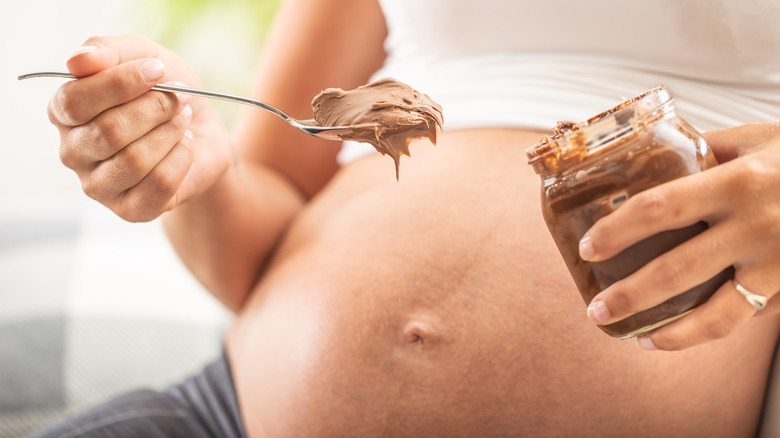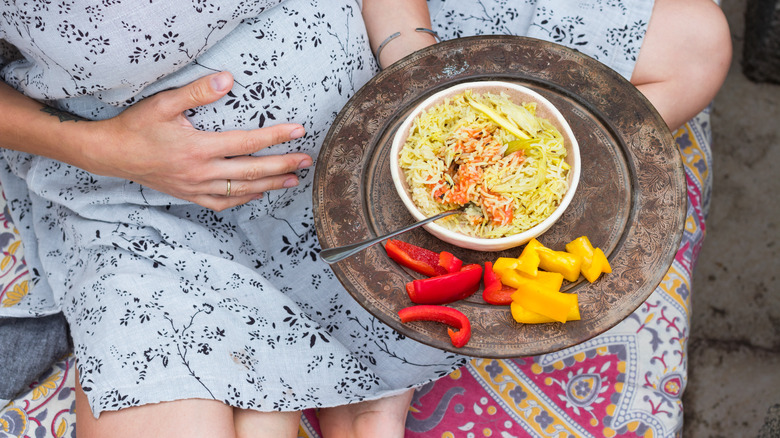What Your Pregnancy Cravings Are Really Trying To Tell You
Being pregnant can change a woman's relationship with food in various ways. Some may suddenly find themselves devouring dishes they'd never previously enjoyed, while others develop an aversion to what were once their favorite foods, feeling queasy at even the slightest whiff. Cravings are almost a rite-of-passage for many pregnant women. This fairly universal phenomenon occurs in approximately 50-90% of moms-to-be in the U.S., and there's a long line of old wives' tales about what different types of cravings might signify (via Frontiers in Psychology). A longing for something salty was once believed to indicate that you're having a boy, whereas the desire for something sweet was said to point to a girl (via Healthline).
Many women start having cravings during the first trimester, and their food infatuations are usually in full swing during the second (weeks 13 through 27), slowly diminishing after that (via Healthline). Interestingly, some researchers suggest that cravings can provide a clue into what's going on physically or emotionally for women — that they may be due to hormonal changes, nutritional deficiencies, specific ingredients or compounds in different foods, or cultural and psychosocial factors (via Frontiers in Psychology). But it's important to note that the science behind this is still in its infancy: Cravings — and the reasons that underlie them — are complex and can differ from person to person. Here's what your food-related yearnings might be trying to tell you.
Pickles
Pickles have come to be known as the quintessential pregnancy snack, but this iconic food craving is more than just a cliché. A survey conducted in the U.S. showed that pregnant adolescents in their third trimester frequently reported cravings for pickles (via Journal of the American Dietetic Association), while a study of pregnant women in Northern Ireland showed that 5.1% expressed a strong desire for picked foods (via Journal of Human Nutrition and Dietetics).
Besides their crunchy texture, pickles are favored for their salty and sour flavor. According to Parents Magazine, research carried out by Valerie Duffy, an associate professor at the University of Connecticut in Storrs, suggested that cravings for pickles might stem from a need for more sodium due to an increased blood volume. But some researchers point out that many expectant mothers often report cravings for low-nutrient foods like "sweets, desserts, and chocolate," yet seldom crave other sodium-rich "vegetables" that are packed full of the nutrients that are needed for fetal development during pregnancy (via The Quarterly Review of Biology). This may call into question the hypothesis that the yearning for pickles is tied to a nutritional deficiency or a need for more calories. Instead, some research puts forward the theory that this supposedly strange craving is such a pervasive stereotype that pregnant women might be culturally primed to think they want to gorge on pickles when they're expecting (via Frontiers in Psychology).
Ice cream
Salivating over the thought of a cold scoop of ice cream is fairly common among pregnant ladies. Up to 22% of women report an affinity for sweet flavors during their first trimester, ranging from ice cream to fruit juice to candy (via Journal of the Academy of Nutrition and Dietetics). Some researchers suggest that this sudden sweet tooth may be indicative of a calcium deficiency (via Verywell Family), since dairy — while loaded with sugar and fat — happens to be a rich source of calcium (per Heathline).
Some researchers speculate whether this popular craving — a bit like pickles — may be culture-bound. For instance, while women in the U.S. tend to cite ice cream as the sweet treat they crave the most, research shows that 22.7% of pregnant ladies in Tanzania can't get enough mangoes as their go-to indulgence (via Tanzania Journal of Health Research). Scientists admit that there may be psychological factors at play, as humans sometimes crave foods that we consider to be "forbidden" and "off-limits" (via Current Drug Abuse Reviews).
Spicy foods
It's estimated that around 3.3% of pregnant women report cravings for spicy foods like curry and chili (via Journal of Human Nutrition and Dietetics). Some researchers speculate that this may be due to pregnant women feeling especially hot and overheated, which is common due to the increased flow of blood that causes their blood vessels to dilate and their bodies to feel warmer than usual (via Healthline). The idea of seeking out hot food to help you cool down may sound contradictory, but research has shown that capsaicin — a chemical compound found in different types of hot peppers that gives them their spicy kick — has unique properties that affect your body's thermoregulatory system (via Temperature). In particular, capsaicin excites certain neurons that create a sensation of warmth, which may give rise to perspiration and panting that "counteract overheating of the body."
Based on a study of traditional superstitions from the Podlaskie province in Poland, a prevalent belief among residents is that craving spicy food during pregnancy signals that a woman will be having a boy — though, there's no actual scientific footing for this (via Progress in Health Sciences). Other researchers continue to explore the idea that pregnant women tend to crave foods that are culturally familiar: A study of women from four different ethnic groups in the U.S found that many Cambodian and Hispanic participants were more likely to cite a predilection for spicy foods throughout their pregnancies (via Ecology of Food and Nutrition).
Lemons
The longing for lemons might sound a tad strange, but a 2016 study notes that some women have a strong desire to suck on fresh lemons during pregnancy (International Journal of Dentistry and Oral Health). Although there's a dearth of research on precisely what this craving reveals, scientists suggest that the inclination to consume bitter substances, both edible and inedible, tends to occur in people with anemia — a condition in which your body doesn't produce enough healthy red blood cells due to a lack of iron (via Medical News Today). This can lead to a slew of health issues for you and your baby including delayed growth and development, premature birth and low birth weights, as well as heart problems caused by lack of oxygen.
Another deficiency that may be triggering your lust for lemons is a lack of stomach acids, say researchers (via Healthline). Lemon juice has an extremely high citric acid content that has an acid-neutralizing effect on the stomach when ingested. This is an excellent remedy for indigestion, also referred to as heartburn or acid reflux, which is another common symptom during pregnancy due to hormonal changes (via Cleveland Clinic). Lemons can be soothing on the stomach while offering up a copious supply of vitamins, from potassium to vitamin C, per Live Science. It's helpful to bear in mind, however, that frequent and repeated exposure to their acids over time can cause dental erosion and damage (via International Journal of Dentistry and Oral Health).
Broccoli
You rarely hear about someone hankering for a plate of steaming broccoli ... unless they're pregnant, of course. Approximately 12.2% of women list "vegetables" as their number one food craving, say researchers, and some specifically mention broccoli as the frequent object of their desire (via Journal of the Academy of Nutrition and Dietetics). After all, broccoli is an excellent source of folate, which is particularly important for fetal development (via Healthline), as it promotes normal tissue growth and cell function and prevents brain and spinal cord abnormalities in your baby (via Mayo Clinic).
This particular cruciferous vegetable is a melting pot of powerful nutrients that your pregnant body may be demanding, such as a large amount of protein (in comparison to other vegetables), which is vital for your fetus's growth, per Mayo Clinic. Broccoli, like other leafy greens, also has an abundance of vitamin K (via Healthline). This fat-soluble vitamin enables your liver to make proteins that help your blood to clot (via Harvard T.H. Chan School of Public Heath), which is particularly important when your body is recovering after giving birth (via Scientific Reports). More rarely, vitamin K deficiency in babies or their mothers can cause "hemorrhagic disease" — a potentially life-threatening condition that increases your newborn's risk of excessive bleeding.
Fruit
Research shows that almost 19% of women in the US express a pining for fruit or fruit juice during their pregnancy (via Frontiers in Psychology). An early study of 1,000 pregnant women in Sri Lanka from the Indian Journal of Public Health found that 40% of subjects had a craving for unripe fruits and 30% for ripe fruits. The former study points towards a possible nutritional deficiency as one of the underlying reasons for food cravings. In the case of fruit, this could indicate an urgent need for a wallop of vitamin C, which most fruits are laden in, including oranges, apples, and berries (via Healthline). Vitamin C is an essential micronutrient that the human body isn't able to produce by itself (via Babycenter). It's vital for both the pregnant woman and their baby, assisting with immune health, wound healing, iron absorption, as well as producing collagen which is needed for the fetus's development.
A preference for sweet foods is common among most expectant mothers; but women also tend to crave more sour tastes in the second and third trimesters than in the first (via Parents Magazine). This could be the body's way of seeking more calories and ensuring that it receives a more balanced array of foods while the baby is rapidly growing in the womb. It might also account for the prevalence of fruit cravings throughout most pregnancies, since many fruits are a blend of both sweet and sour flavors.
Beetroots
Mamas-to-be may be turning to this magenta-tinted vegetable for a number of reasons. A beetroot craving certainly makes sense on a nutritional level, since a woman's nutritional needs change substantially throughout pregnancy (via Nutrients), with folate, in particular, playing a critical role in preventing neural tube defects and other fetal abnormalities (via Centers for Disease Control and Prevention). Beetroots happen to be a plentiful source of folate (via NutritionData). It can be difficult for women to get a sufficient amount of this B vitamin from food alone (namely 400 micrograms a day), which is why taking supplementation — known as folic acid — in addition to consuming folate-heavy foods is strongly recommended during pregnancy (via Centers for Disease Control and Prevention).
Research investigating the specific benefits of beetroots throughout pregnancy has shown that consumption of the vibrant vegetable may help prevent fetal growth restriction (FGR), which is when a baby's growth is stunted due to a lack of adequate blood flow in the placenta (via Tommy's). Specifically, beets are rich in dietary nitrates, which your body converts to nitric oxide — a powerful compound that causes your blood vessels to relax and dilate, increasing blood flow throughout the body and across the placenta. So, if your appetite hasn't already been screaming for a beautiful bowl of beets, it may be time to step up your beetroot game.
Chocolate
For many women, chocolate cravings are rampant during pregnancy. Based on a study from the Journal of the Academy of Nutrition and Dietetics, 35% of women cite sweet foods, especially chocolate, as topping their list of frequent cravings, while a survey carried out in the UK showed that chocolate was one of the most commonly craved foods among pregnant ladies (via Vitabiotics). Cocoa contains a vast assortment of health-boosting properties, from zinc to iron to magnesium, not to mention a plethora of antioxidant flavonoids (via Medical News Today). However, researchers point out that cravings develop as early as the first trimester of pregnancy, "long before a majority of fetal growth (and thus fetal demand for nutrients)," which suggests there may be other factors at play beyond the quest for specific nutrients (via Frontiers of Psychology).
Another theory is that an increased penchant for chocolate functions as a form of self-medication during pregnancy. A study from the Journal of the Academy of Nutrition and Dietetics revealed that chocolate is brimming with specific alkaloids that increase serotonin — a mood-stabilizing neurotransmitter in your brain — which can have an antidepressant-like effect and create a feeling of wellbeing. "Most likely, a combination of chocolate's sensory characteristics, nutrient composition, and psychoactive ingredients, compounded with monthly hormonal fluctuations and mood swings among women, will ultimately form the model of chocolate cravings," concluded the study authors.
Ice
Chomping or chewing on ice (called "pagophagia") is a quirky craving among pregnant women (via StatPearls). This is considered to be a form of pica — a condition where people experience an urge to consume non-food substances with no nutritional value, like ice or paper. While it's not exclusively a pregnant-lady habit, up to 3% of women report pagophagia at some point throughout their pregnancy, which is often attributed to nutritional deficiencies, according to the authors of a study in Frontiers in Psychology.
Researchers have discovered that pagophagia is another possible symptom of anemia. A study from the journal Medical Hypotheses found that 56% of people with anemia have a craving to chew or eat ice. It was hypothesized that the crunching motion, in particular, can provoke vascular changes that give rise to increased mental alertness in anemic people. A low iron level is one of the most common forms of anemia among pregnant women, as reported by the American Pregnancy Association, affecting around 15% to 25% of moms-to-be. It can have a negative impact on a woman's health, mood, concentration, energy levels, and overall wellbeing — which is the last thing you want when you're already grappling with the physical and emotional challenges of pregnancy.
Chalk
While chewing on ice can be shrugged off as relatively innocent, the urge to chow down on chalk sits on the slightly wacky end of the craving spectrum. This is another form of pica (the practice of consuming non-food items) — and a peculiar predilection that occasionally crops up among pregnant ladies, notes the American Pregnancy Association. "Pica is usually seen in the first trimester but could present at any time during pregnancy," medical doctor Njoud Jweihan reported via the website MomLovesBest. Jweihan advises women to inform their doctor of any nonfood cravings they may be having, even if they seem fairly harmless, as they could be indicative of a vitamin and mineral deficiency or a psychological or emotional condition.
As many as one out of five women who experience pica has a high-risk pregnancy, which further endorses the idea the behavior is rooted in specific nutritional needs (via Nursing for Women's Health). Research confirms that the propensity isn't culture-specific, as it's been observed among women from various different racial and socioeconomic groups in the U.S. A 2015 meta-analysis of more than 6,000 pica sufferers found that the condition is often steered by scarce levels of zinc and iron in the blood (via American Journal of Human Biology). Some studies have shown that women's pica tendencies diminish after taking zinc and iron supplements for some time (via Journal of the American Dietetic Association). But the type of dietary deficiency that specifically drives a chalk craving during pregnancy beckons further investigation.
Peanut butter
If you frequently have the urge to satisfy your taste buds with a spoonful of peanut butter during pregnancy, you're not alone. A 2015 study from the Journal of the Academy of Nutrition and Dietetics revealed that 13% of pregnant women mentioned a "salty food" craving during their first trimester, with peanut butter being one of the specific foods cited within that category.
Peanut butter may be on your radar for a number of different reasons, say researchers, including a specific nutritional need that your body is calling out for (via Journal of Human Nutrition and Dietetics). This plant-based protein helps support both you and your baby's health in myriad ways. In particular, peanut butter is a good choice for helping the body maintain blood glucose homeostasis due to its low glycemic index (via British Journal of Nutrition). It might play a beneficial role in managing gestational diabetes, defined as abnormal blood glucose levels during pregnancy, which occurs in roughly 2-10% of women each year in the U.S., per the Centers for Disease Control and Prevention. Researchers have proposed that "cravings for salty food during pregnancy may be protective against later risk for abnormal glucose tolerance" (via Journal of the Academy of Nutrition and Dietetics). What's more, peanuts are a powerful source of fiber, niacin, folate, and magnesium, as noted by the study from the British Journal of Nutrition — which are high on the list of daily nutritional requirements for expectant mothers (via perinatology.com).
Rice
A study of early pregnancy cravings in American women found that approximately 4.9% specifically reached out for starchy foods like rice, which usually goes hand-in-hand with increased carbohydrate intake (via Journal of the Academy of Nutrition and Dietetics). There tends to be an increase in carbohydrate cravings during pregnancy, notes Marcia Pelchat, a physiological psychologist and cravings expert at the Monell Chemical Senses Center in Philadelphia (via HealthDay). "There is a lot of evidence that hormones may drive these cravings, but no one has any idea what the mechanism might be," Pelchat tells HealthDay. "Another hypothesis is that it's habitual. Women are feeling crummy, they feel like indulging, so they eat carbohydrates or chocolate." In other words, rice is a classic comfort dish — and low glycemic options, like Mahatma rice, may also have sleep-promoting properties (via Advances in Nutrition).
A study of Japanese females published in the journal Nutrients found that rice was one of the most widely and frequently craved food among women, reinforcing the idea that our culture is a strong determinant of the types of foods we come to crave (via Appetite).
Bread
Unsurprisingly, the craving for starchy and calorically dense carbohydrates like bread are commonly reported during pregnancy (via Frontiers in Psychology). "The most publicized cravings are the strange ones, but the reality is that most pregnant women crave carbohydrates and are less attracted to red meat," OBGYN Felice Gersh told SheKnows. High-carbohydrate foods can serve up feelings of comfort and consolation throughout the different stages of pregnancy as the body undergoes a medley of hormonal changes (via Verywell Family).
Pregnant women may also find themselves hungering for a hunk of bread to curb their nausea, notes Amanda Capriglione, a registered and certified dietitian nutritionist, explaining that: "Carbohydrates are the go-to for morning sickness," (via Romper). A rapidly changing mood might also be to blame: Carb cravings could be your body's way of trying to regulate and upkeep your emotional wellbeing, suggest researchers (via Eating Behaviors). Various carb-heavy foods — including bread — contain the amino acid tryptophan, which helps churn out serotonin, namely your brain and body's "feel-good" chemical. Further research may help dig deeper into the specific nutritional implications of craving bread while pregnant.

